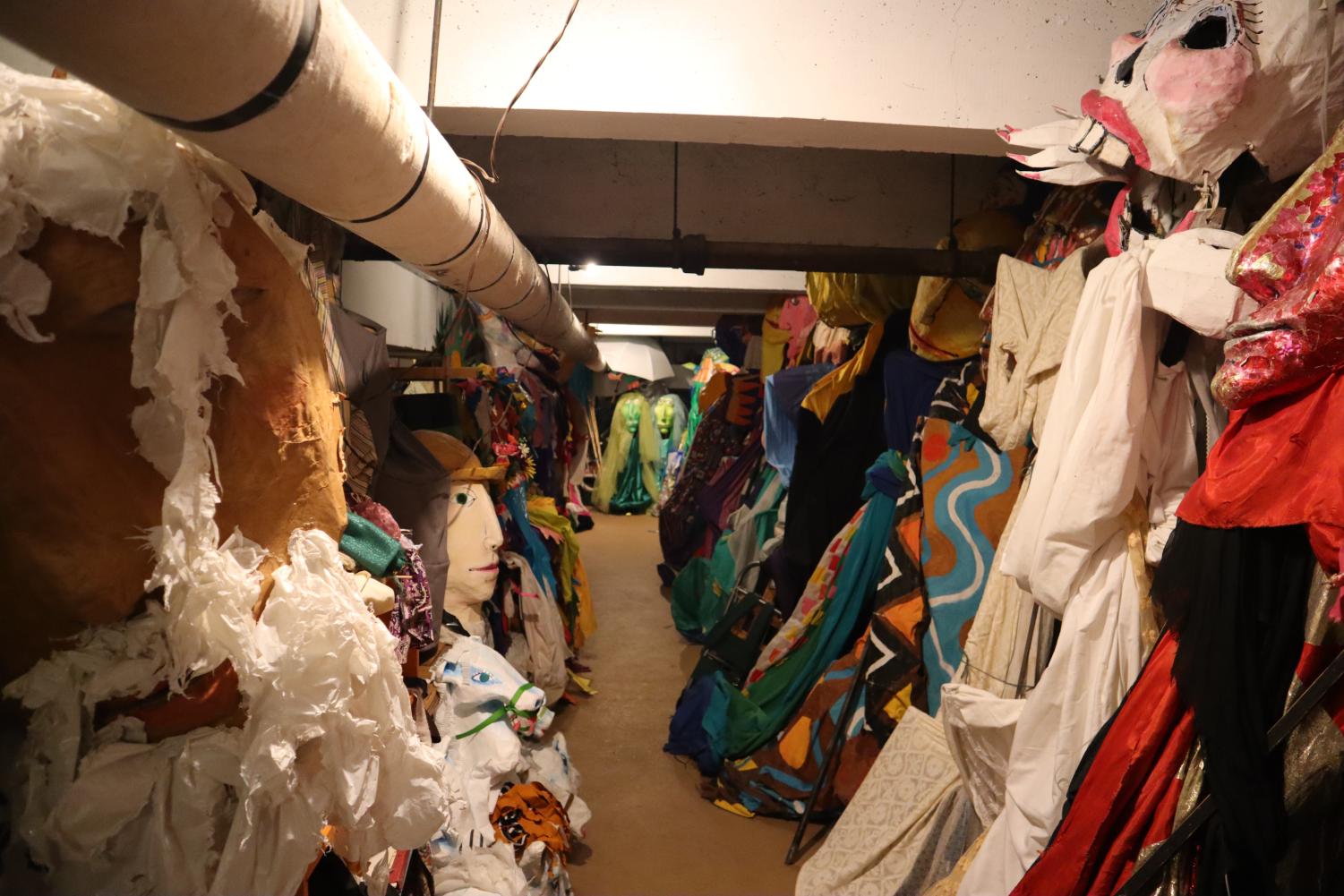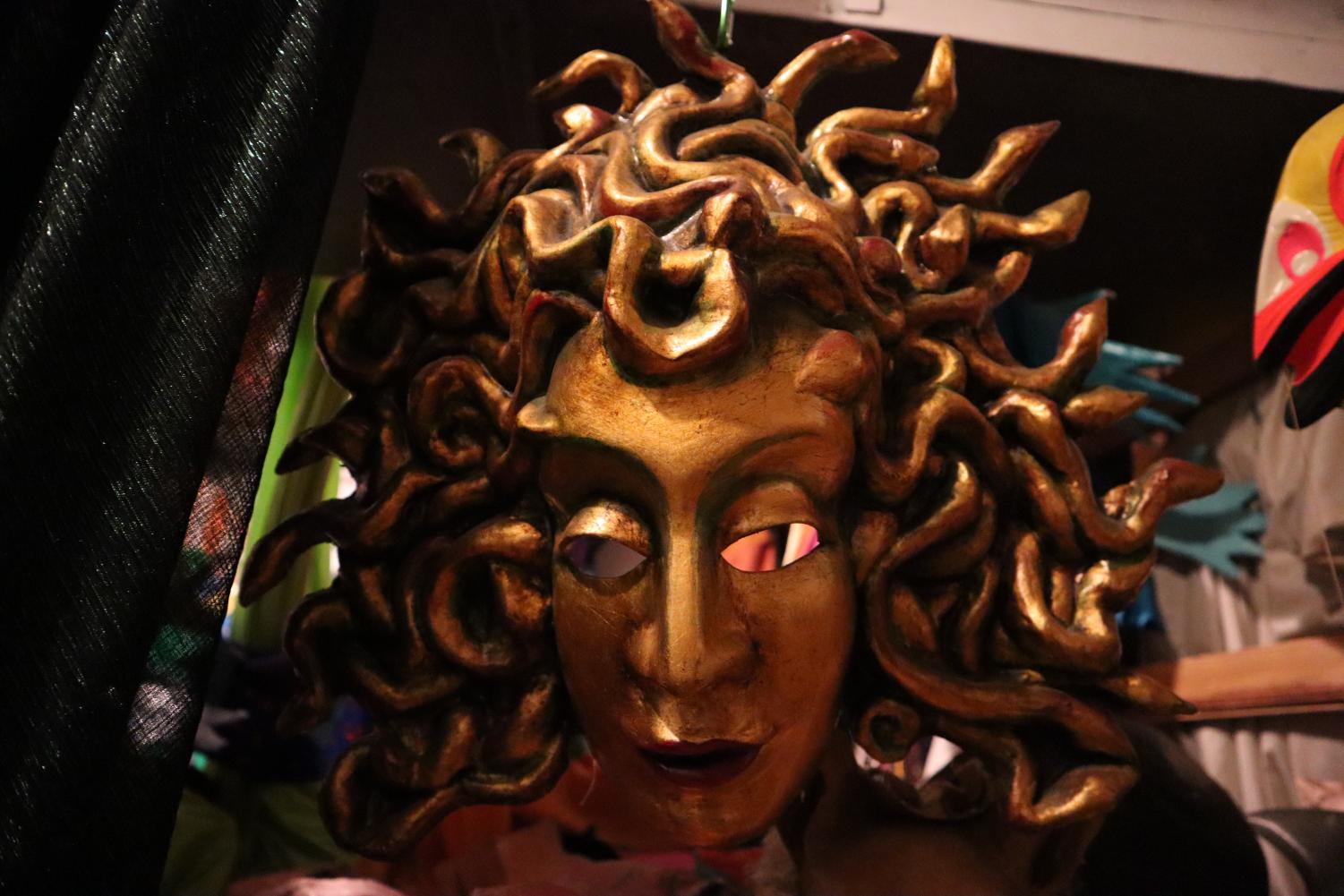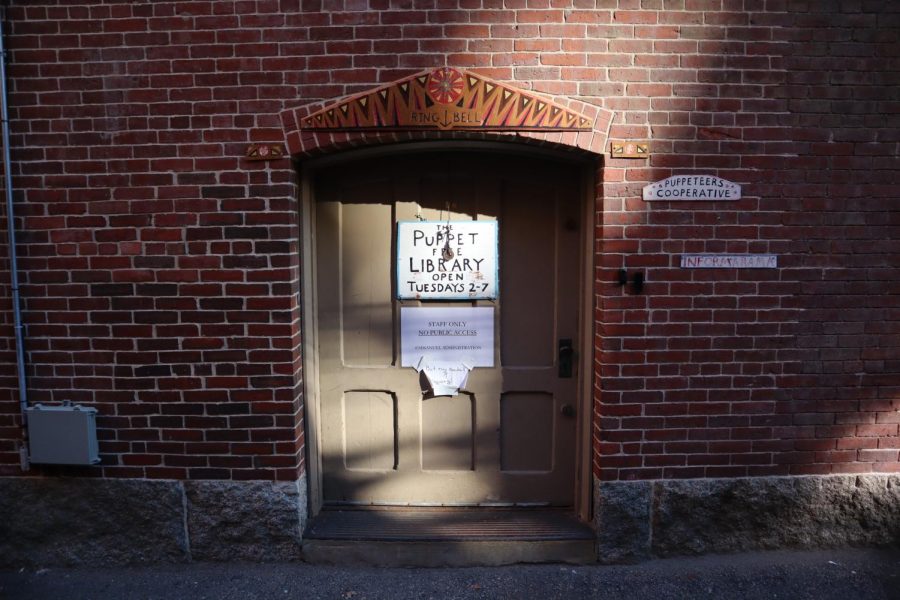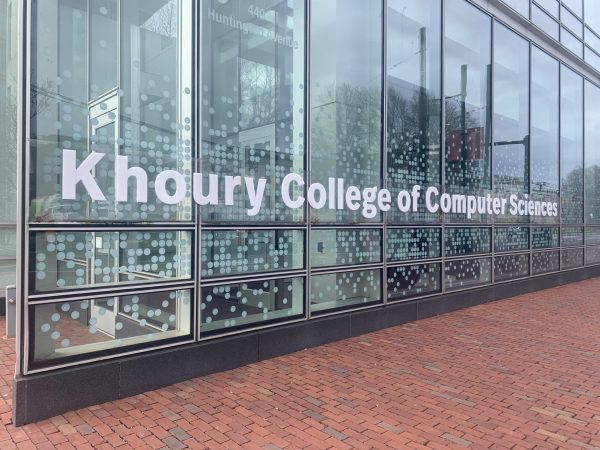‘It’s sweet when puppets remain alive’: Boston puppet library animates local events
he entrance to the Puppet Free Library sits on an alley adjacent to Newbury Street. The organization has provided puppets to locations all over New England for community events.
March 16, 2023
Behind the bustling Newbury Street on Public Alley 437 is a small arched door, adorned with a painted panel instructing visitors to ring the bell dangling upon it.
It’s fit for an entrance to a magical world, and in a way, it is — leading the way to Boston’s Puppet Free Library in the basement of the Emmanuel Episcopal Church.
Stocked with parade puppets and banners, gigantic heads of Poseidon and Mother Earth, 10-foot tall giraffes, blossoming flowers and fiery dragons, the puppet library has almost every character imaginable. All are available to be borrowed, for free, to animate community events and celebrations across New England and New York City.
Sara Peattie, the artist, or “puppeteer,” is behind the hidden library. Her workshop next door is stocked with hundreds of the puppets, many of which she made.
Peattie has worked with puppets for over 40 years, ever since being apprenticed to a puppeteer when she was 18. That puppeteer was the famed Peter Schumann, co-founder and director of the Bread & Puppet Theater. Peattie, however, never planned on pursuing puppetry.
“I’m just like, in awe,” she said. “I never had intentions of anything.”
She is often baffled by her “random life,” she said.
Peattie founded Puppeteers Cooperative in 1976 with the late puppeteer George Konnoff in San Francisco after the two worked with Bread and Puppet in Vermont. The nonprofit is an association of puppeteers, theatre artists and other musicians who work towards community outreach and education. Following Konnoff’s passing in 2001, Peattie continued their work, linking the cooperative more and more with the community.
Peattie attributes the plan to Konnoff and said she came to Boston following his motivation.
“He was the one who was going to do big pageants at Lincoln Center,” Peattie said, “and world domination through puppetry.”
The puppet libraries began in Boston, then known as the Back Alley Puppet Theater. The library originally loaned puppets to the public informally, but was made official around 1995. Though the library is open to visitors every Tuesday, most of its work focuses on the lending aspect. Peattie’s puppets usually take about a week to make and the library lends out a couple every week.

Peattie spends most of the time in her workshop rather than the crowded, low-ceiling storage room where the puppets are located. She admits they are a little unsettling — her brother won’t even enter the puppet storage room because of “all the little eyes looking at him.”
“These aren’t the kind of things you would want around the house,” she said, speaking about the puppets. “That’s why I don’t bother too much about lending them out, they always come back.”
Her studio is a much larger space with a collection of supplies she has built up for decades.
“It’s amazingly large,” she said. “I come in and do whatever. If there’s an event, I get stuff ready for it. I’m doing a Purim spiel … so I get cardboard and materials ready for that or I work on stuff that’s broken.”
Peattie’s days never quite look the same.
“That’s what’s nice about puppetry,” she said. “You get long days in the cellar doing papier-mache and then you’re running around in the street with crowds of people or workshops with kids.”
The cooperative and the lending libraries participate in many events, such as First Night celebrations.
Alex Mrusek, the parade director for the Boston First Night Parade, a New Year’s Eve celebration of artistic performances, says that the use of Peattie’s puppets contribute greatly to the vibrancy of the event.
“The puppets have been a staple of the parade for a while and I think that’s because they bring such a different look and feel and they bring such a sense of community,” Mrusek said.
First Night commissions puppets from Peattie, whether that be flying swans or great beasts. They have been working with her for so long that they trust her to do what she thinks is best. Mrusek believes they have the staying power to be a part of the celebration for years to come because of their connection to the neighborhood.
“I think it’s representative of the city because it’s such a big vibrant group,” Mrusek said.
The cooperative has a big presence in New York as well, with pageant nights at Lincoln Center, Halloween parades and many other events.
Theresa Linnihan, founder of the New York Puppet Library, has collaborated closely with Peattie over the years. Both the New York and Boston Puppet Free Libraries are creations of the Puppeteers Cooperative.
“It was really Sara’s notion that we should take all of our puppets that had accumulated over several years of doing pageants in New York and were all in storage and in different places and make a puppet library,” Linnihan said.
The New York Puppet Library opened in 2003, and in 2004, the library moved into the Soldiers and Sailors Memorial Arch, a Civil War monument in the heart of Brooklyn at Prospect Park.
“It was a free opportunity for the public to experience the arch and to be able to service their imaginative needs with puppetry,” Linnihan said. “We were putting the roots into these stories and making rather sophisticated tellings of traditional fairy tales.”
Linnihan spoke fondly about this time, how she biked over to the Arch every Saturday, hung up the banner and watched curious people stop and peer in the doorway.
“I can’t underline enough how it was a magical time in my life,” Linnihan said. “Hearing [people’s] voices wander up the spiral staircase and their exclamations in surprise and the wonder of it and then coming down and asking more about it and asking if you can borrow puppets for free.”
Due to infrastructure complications, the library moved to Brooklyn College in 2009, where it remains today.

Linnihan later returned to her birthplace of Minneapolis, but she often travels to New York City for work. She is currently working with In the Heart of the Beast Puppet and Mask Theater to create a puppet library in Minneapolis.
Linnihan discovered puppetry in the same way as Sara: with the help of Peter Schumann. Bread and Puppet helped her theatre company, Theater in the Open, in the late 1980s. Maudslay State Park granted residency to the theatre, at that time known as The Newburyport Children’s Theater, where they had to perform in the middle of the woods.
“A squirrel would upstage us completely,” Linnihan said.
The use of puppetry allowed the company to perform outdoors with a large landscape as their stage.
“We could have a giant goddess rise from behind a hill, we could use the wind, we could have forests of flowers, we could change the size of people, simply with puppetry and the images that puppetry can provide,” Linnihan said.
She’s grown to appreciate puppetry over the years and has worked with Peattie to ensure the puppets are fully available to the public.
“Puppets need attention and they need repairs sometimes, but what was wonderful about the puppet library is that they could go to work,” Linnihan said. “It’s sweet when puppets remain alive. When they go into a storage unit or someone’s garage, they just sit there as inanimate objects. There’s a sadness to that because they were designed as a form of magic.”
“Libraries often do that, remind you how everything is connected,” Linnihan said.
The Puppeteer’s Cooperative is always looking for more engagement, and although Peattie always enjoys new events to perform at and new puppets to create, she appreciates the life she has built for herself.
“In theory I want to expand, but in the winters, sitting around in the cellar doing papier-mache is kind of great,” Peattie said. “I drink tea, I listen to long Victorian audiobooks… It’s not an exciting or a meritorious life, but it’s kind of great.”


















